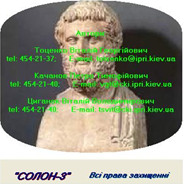Decision Support System "Solon-3"
Decision support system “Solon-3” is designed for decision-making support while planning large-scale complex target-oriented programmes, intended for implementation during a certain time period, validation of decisions regarding intermediate program goals, inclusion of various political, social or economical activities (“projects”) into the programme, and resource distribution among them, based on their estimated impact upon the main programme goal achievement.
DSS “Solon-3” is collective-usage system. Its knowledge base is compiled by multiple experts, i.e. highly-qualified specialists in various knowledge fields.
Decision Support System “Solon-3” for Complex Target Programme (CTP) Formation: DSS “Solon-3” uses the original method based on main programme goal decomposition, knowledge base (goal hierarchy) creation, and target-oriented evaluation of alternatives.
DSS “Solon-3” provide a tool for a decision-maker (DM) to assist him\her in solving the following problems:
• quantitative analysis of external factors (adoption of legislation, governmental instructions, changing the international market situation etc) impact upon main or intermediate goals of the CTP, selected by the DM;
• identification of the most promising directions of complex target-oriented programme implementation;
• calculation of relative efficiency of decision variants in telation to specific actions (projects) directed at CTP implementation;
• defining relative danger of threats and risks.
DSS “Solon-3” is used for solution of a whole series of problems emerging during strategic planning of a region (industry or business) development, and for everyday activity on managing this object. DSS of this type should be the key element of an analytical centre, functioning under the top-manager and solving problems of the specified types.
“Solon-3” system provides opportunities for:
• implementation of top-manager’s strategic plans in the CTP;
• integration of many specialists, facilitating highly-professional decision-making;
• quantitative comparison of different CTP variants;
• project evaluation within given period of time;
• on-the-spot “what if?” (scenario) analysis;
• quantitative analysis of social-economical programmes;
• consideration of hundreds of factors including direct and reverse connections between them – the task which any individual or group is incapable of fulfilling if “manual” decision support technologies are used;
• confidential usage of collectively built DSS knowledge base by the manager, for substantiation of unique decisions in the everyday practice.

